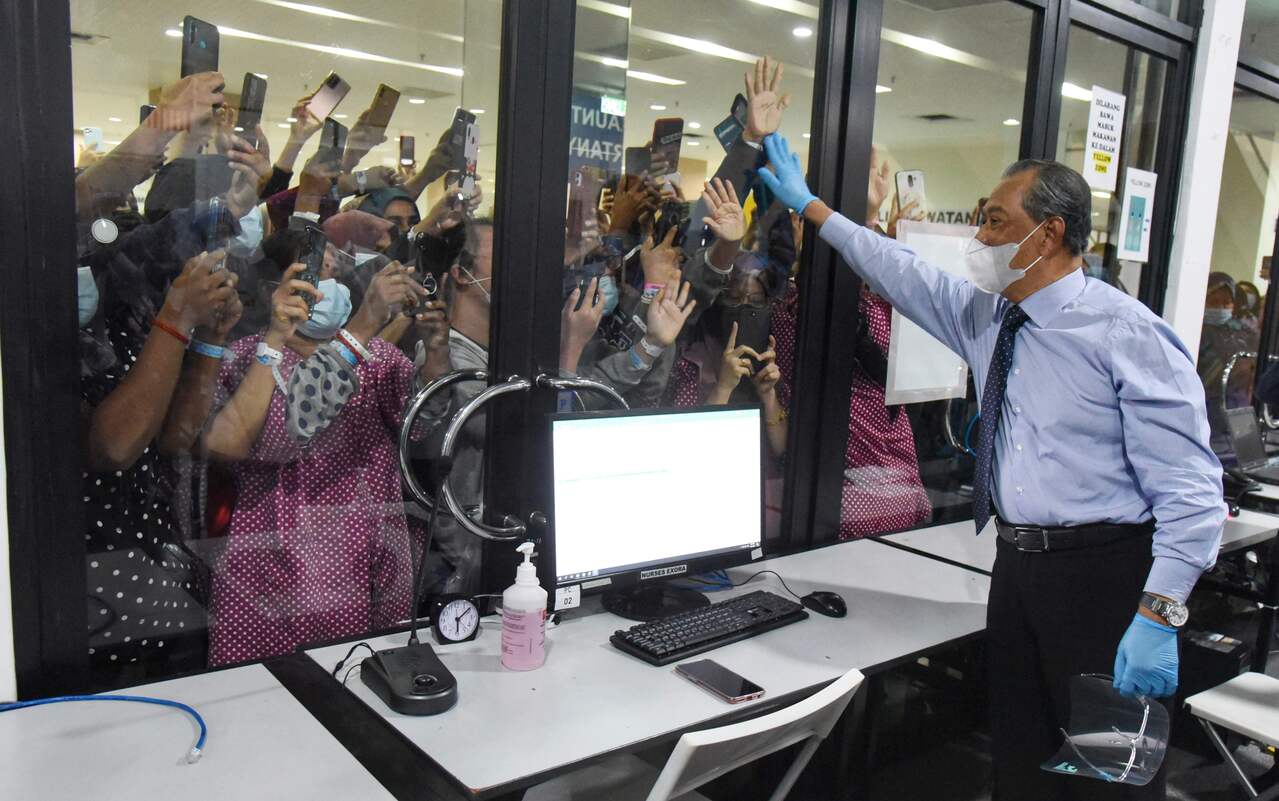Drop in approval for Malaysia PM Muhyiddin's government: Survey
Sign up now: Get ST's newsletters delivered to your inbox

Malaysian Prime Minister Muhyiddin Yassin visiting a quarantine facility in Serdang, outside Kuala Lumpur, on Jan 19, 2021.
PHOTO: AFP/MALAYSIA'S DEPARTMENT OF INFORMATION
Follow topic:
KUALA LUMPUR - Public approval for the government of Prime Minister Muhyiddin Yassin has dropped, a nationwide survey by a think-tank headed by a colleague from his own Parti Pribumi Bersatu Malaysia (Bersatu) has shown.
Conducted by Emir Research at the end of 2020, it showed that only slightly over a third of respondents, or 35 per cent, saw Tan Sri Muhyiddin's government as viable, down from 43 per cent in August that year.
The number of Malaysians who did not see the government as viable jumped from 9 per cent to 19 per cent, while another 46 per cent said they were "not sure" about the government.
There was also a sharp rise - from 49 per cent to 62 per cent - of those who agreed with the notion that there are "moral problems" among political leaders in the country.
Almost 50 per cent of Malaysians said they were uncertain about the future, the economy and the government's ability to lead the country.
The survey was conducted before Mr Muhyiddin's government reintroduced a partial lockdown through the movement control order (MCO) and advised the King to implement a seven-month state of emergency in January, amid a worsening Covid-19 situation in the country.
Emir Research is headed by Datuk Rais Hussin, who is a member of Bersatu, the party in which Mr Muhyiddin serves as president. Mr Rais was also appointed chairman of Malaysia's digital economy agency after Perikatan Nasional (PN) came into power in March 2020.
Bersatu is part of the loose ruling PN coalition comprising 12 political parties.
The survey results come at a time when Mr Muhyiddin's government is facing increasing criticism for its handling of the pandemic.
Despite the MCO in all but one state in the country - which incidentally has led experts to forecast a sharp slowdown in economic recovery this year - there has been no let-up in the number of infections, with multiple daily records set since it was implemented three weeks ago. The figure was 5,728 last Saturday (Jan 30).
The government is due to announce an extension or lifting of the MCO later this week. The high case load - with almost 50,000 active cases - has, in the meantime, pushed the country's health system to breaking point and limited contact tracing activities. Asymptomatic patients are now serving their quarantine at home.
The survey also found a drop in approval for the government's response to Covid-19, especially after the Sabah state election in September, which contributed to the current wave of infections.
The survey said 62 per cent of respondents approved of the handling of the pandemic overall, down from 72 per cent in a previous survey. Only 45 per cent of 1,976 respondents, though, approved of the response since the Sabah poll.
The election, which PN won, saw voters and politicians from the mainland descending on the state, leading to infections spreading to the peninsula when they returned. Malaysia began registering four-digit daily infections in October 2020, and a two-month conditional MCO - a less stringent version of the original - failed to bring down the numbers.
The authorities reopened much of the economy and lifted travel restrictions ahead of Christmas and New Year, causing daily infections to soar further.
Mr Muhyiddin, who came into office through a series of defections from the former ruling Pakatan Harapan in early March 2020, initially was popular as the strict three-month MCO between March and June last year brought cases down to single digits.
But the euphoria soon dissipated and his government has been heavily criticised in recent months for, among other things, perceived double standards in the enforcement of Covid-19 rules for politicians and regular citizens.

